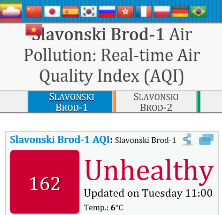We are delighted to welcome our first writer from Slavonski Brod to the TCN team on March 6, 2017, and Tina Burka-Čondrić opens with an issue which should be attracting more international attention and government action - the terrible air pollution in the city, which can be easily improved.
Slavonski Brod, a town located in the Slavonia region, with a laid back attitude, where there is always time for a coffee at the local, home to footballers Mandžukić and Olić, internationally famous storks Malena and Klepetan, and just over 59 000 residents.
Slavonski Brod is often referred to as a “transit city” being a major east-west transportation corridor, with the A3 motorway serving as a transit route from the European union to the Balkans. As well as bordering with Bosnia, just over the river Sava. A town with great potential, if it wasn’t choking and gasping for fresh air - literally.
Just over the border in Bosnia eight years ago the once modern and impressive oil refinery, now old and run down, damaged during the war, and in great need of modernisation, was put into use, it is since then that residents of Slavonski Brod have complained, pleaded, petitioned, protested, relentlessly and desperately appealed to the government to help their cause, for clean air, but to no avail. Residents are not asking for the refinery to be closed down, but for the appropriate filters to be installed and appropriate maintenance to take place, but this is proving to be an impossible mission.
Often the questioned is raised how is it possible the refinery is causing such damage today, when during the time of former Yugoslavia, the refinery was functioning without any problems. What has to be taken into account is that this was once a new state of the art plant, after many years of war, and decades of little to no maintenance, and the refinery was left in a derelict state. Today the refinery processes a maximum of 1800 tonnes of crude oil a day, during the time of former Yugoslavia the refinery was processing up to 9000 tonnes of crude oil daily. Another factor leading to more pollution is the refinery used to process north African crude oil, referred to as “sweet” oil, low in malodorous sulphur compounds, whereas today the Russian “sour” oil, used is high in malodorous sulphur compounds.
Alarming rates of poor air quality are a regular occurrence in Slavonski Brod, and hospital staff at the local hospital confirm that there is a direct corollation with more visits to the emergency room when air quality is extremely poor, and there are direct links with the poor air quality and respiratory, vascular and artery problems. There is no denying the harmful impact of sulphur and particulate matter.
Many meetings have been held with both Mayors, several environmental ministers that have come and gone, Milanovic, Plenković, Russian owner Zarubezhneft, Croatian oil company Janaf, they have all throughout the years given their support and vowed to resolve the issue, but 8 years later residents are still choking on sulphur, and other harmful chemicals to which they are exposed to day and night.
Last November another protest was organised by a newly formed non-profit group “Brođani za Brod,” with a large show up of 4000 people, where thousands more including numerous Croatian celebrities gave their support via social media, using the #nemapredaje hashtag. Another protest the following month was held, the intersection leading to the Bosnian border was blocked, which up to six hundred people attended. Many meetings later residents are still waiting to see any results. With Politicians saying something will be done by 2020, residents are bitter and doubtful as they have not seen any progress, waiting another 3 years for residents, is just unacceptable, the topic only recently being bought up in parliamentary discussions, most certainly not mentioned in the European parliament.

We spoke to Mr Mladen Sudar co-founder of Brođani za Brod to see if there is any progress being made, there were 7 demands of which none were met in the time frame. This is why the second protest blocking the border was held, and there are also plans to boycott shopping over the border considering that weekly 3000 cars from Slavonski Brod cross the border, of which each is leaving at least a few hundred Kuna there. When asked why numbers of people attending protests has become much smaller, Mr Mladen Sudar suggests that this long cold winter impacted on the attendance as well as the feeling of hopelessness among residents. It is something we’ve been battling for eight years, during which there have been many promises by all involved, but no action, and people are bitter, they’re frustrated and see no end in sight. Future plans involve suing the oil plant, and civil disobedience was announced at the protest. Everyone involved has given their support, the Russians have said they will fund the modernisation of the plant, the Croatian government has said they have the funds needed for the pipeline that is on Croatian soil, all entities involved are supporting us. The problem is bureaucracy- and no one is stepping up, everyone is passing the responsibility to the next guy, waiting until 2020, for something to maybe change is not an option for us.


